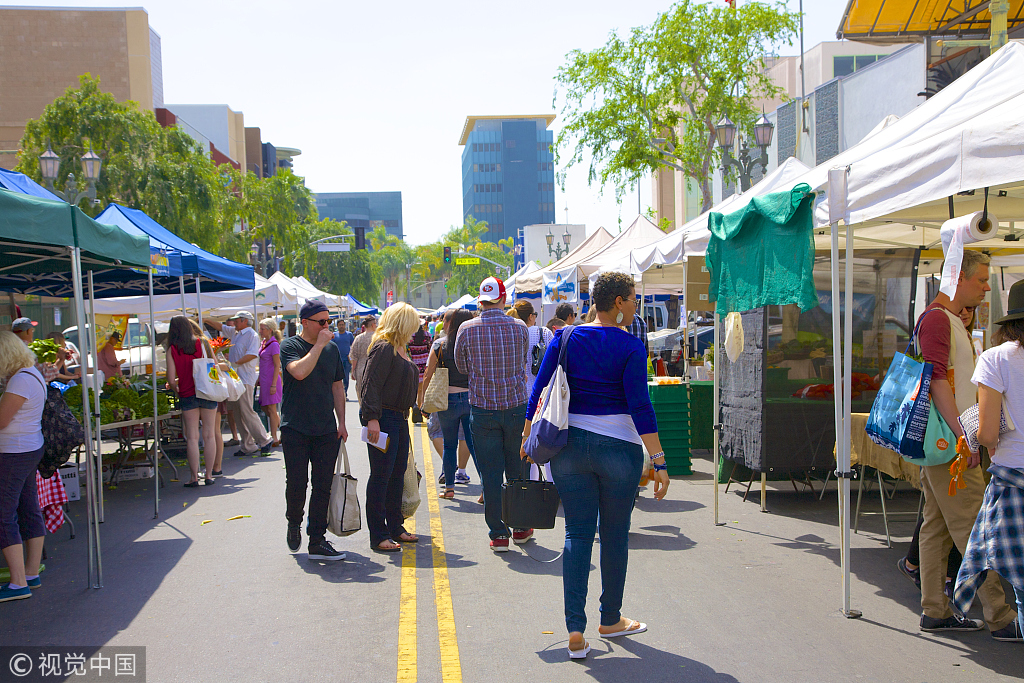
This is People's Daily Tonight.
Gentrification threatens to hurt race relations in US
A trend of gentrification, which is the process of renovating urban areas to conform to middle-class tastes, is threatening to remove personality from Southern California and other US cities, and replace beloved institutions with carbon copy shopping centers.
Yet for all the good that redevelopment does, it is just as likely to have negative effects on race relations since it pushes people of color out of their homes and neighborhoods in the name of progress.
For more than 200 years, the US was aptly known as the world’s “melting pot” because of its mixture of races, nationalities, and cultures. This notion really set the pace for America’s stance as a welcome place for people of all types. Yet right now, landowners in some of America’s largest cities are forcing their ethnically diverse residents out in favor of increased profits.
(Photo: Reuters)
While some might say that redevelopment is “not personal, just business,” it will more than likely lead to some bad blood between races, since wealthy white-owned businesses are at the center of these changes and they are pushing out Hispanics, Asian-Americans, blacks and other races.
As a Southern California resident, I found that one of the best ways to bring people of all races together is through one simple topic: food. In Los Angeles, food culture reigns supreme and one can tour the world’s cuisines by visiting Jewish delis, Chinese buffets, Italian pizza places, Jamaican barbecues, and even Mexican taco trucks. Food brings people together and LA’s “mom and pop” restaurants bring culture and taste to millions each year.
Introducing people to a culture through food is an important step toward tolerance and eventually friendship. Eating together creates a special bond between people and in that instance, they can learn about old traditions, family stories, or how to pronounce names of certain dishes.
Furthermore, since “mom and pop” restaurants are typically run by family members – repeat patrons can sometimes be treated like family themselves.
That same magic that food normally has is being wiped out by gentrification since “mom and pop” owned shops are being replaced by corporate franchises. Such is the case in a Los Angeles Times story about a restaurant called Teddy’s Tacos in City of Industry, California.
Teddy’s, after years of serving the neighborhood, is in danger of being closed down in favor of a Chipotle Mexican Grill. According to the story, the restaurant’s loyal patrons visit regularly, know the head cook by name, and say they would definitely travel out of their way to get Teddy’s Tacos if they were evicted from their current location.

People at L.A. farmer's market. Photo: VCG
Now of course there’s nothing wrong with fast food chain stores, but there is something wrong about a neighborhood losing its identity by having its ethnically diverse food institutions replaced by pre-packaged meals.
Gentrification doesn’t stop there unfortunately, as the housing market is also seeing some major changes in LA’s Lincoln Heights and Chinatown areas.
Some people are worried that Chinatown is in danger of losing its Asian legacy since its Asian-owned businesses are being replaced by big box stores like Walmart. While Chinatown is typically a haven for Asian-Americans who yearn for a taste of home, its residents and business owners are being forced out since they are unable to afford rising rent prices. A 2014 American Community Survey study shows that 95 percent of Chinatown residents, which are largely Asian and Hispanic, are renters who run the risk of being evicted in favor of wealthier residents.
It’s the same story in Lincoln Heights, which boasts a 70 percent Hispanic population and 25 percent Asian population, according to statistics from the US Census. Gentrification is causing a rift between races since residents are largely people of color and the landowners are white. People are getting fed up with being pushed around and gentrification will likely undo years of racial integration for these areas.
The bottom line is that gentrification serves only one purpose: to make money. Yet the need to create harmony between races is more important than money.
These diverse neighborhoods, and the countless others around the world, need to be saved to build trust and friendship among races. Gentrification promotes an “us against them” mentality that is counteractive to peaceful coexistence, and it needs to be stopped before it leads to violence.
(The article reflects the author's opinion, and not necessarily the views of People's Daily.)
(Produced by Ni Tao and Zhao Dantong)


